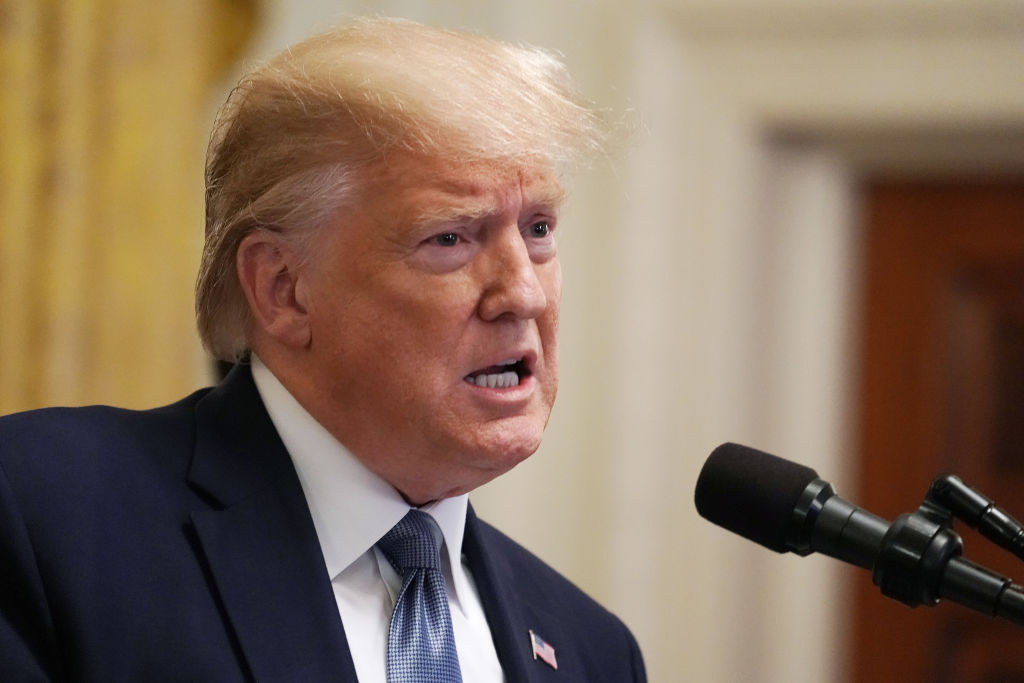Immigrants will soon have to prove they can afford health care when applying for U.S. visa


A free daily email with the biggest news stories of the day – and the best features from TheWeek.com
You are now subscribed
Your newsletter sign-up was successful
In what is considered the Trump administration's latest attempt to curb immigration to the United States, the White House issued a proclamation Friday saying it would require immigrants applying for a U.S. visa to prove they either have health insurance or can afford to cover their own health care costs before entering the country starting Nov. 3.
President Trump said the White House wants to "protect the availability of health care benefits for Americans" as "taxpayers bear substantial cost" in paying for medical expenses of people who lack health insurance. "Immigrants who enter this country should not further saddle our health care system, and subsequently American taxpayers, with higher costs," Trump said.
The proclamation would affect many immigrants, including those with family ties in the country, but it does not include noncitizen children of U.S. citizens or those who have been granted asylum, The Wall Street Journal reports. While the proclamation says it will allow migrants with the "financial resources to pay for reasonably foreseeable medical costs," it reportedly does not list a threshold for those resources. Either way, it is expected to be a major hurdle for low-income families seeking U.S. visas.
The Week
Escape your echo chamber. Get the facts behind the news, plus analysis from multiple perspectives.

Sign up for The Week's Free Newsletters
From our morning news briefing to a weekly Good News Newsletter, get the best of The Week delivered directly to your inbox.
From our morning news briefing to a weekly Good News Newsletter, get the best of The Week delivered directly to your inbox.
"It's a classic catch-22 for low-income immigrants," said Larry Levitt, executive vice president at the Kaiser Family Foundation. "They're eligible for subsidized health coverage through the [Affordable Care Act], but applying for that subsidized coverage means they can't legally be in the country."
The proclamation is expected to face swift legal challenges, The Washington Post reports. Read more at The Wall Street Journal and The Washington Post.
A free daily email with the biggest news stories of the day – and the best features from TheWeek.com
Tim is a staff writer at The Week and has contributed to Bedford and Bowery and The New York Transatlantic. He is a graduate of Occidental College and NYU's journalism school. Tim enjoys writing about baseball, Europe, and extinct megafauna. He lives in New York City.
-
 The Olympic timekeepers keeping the Games on track
The Olympic timekeepers keeping the Games on trackUnder the Radar Swiss watchmaking giant Omega has been at the finish line of every Olympic Games for nearly 100 years
-
 Will increasing tensions with Iran boil over into war?
Will increasing tensions with Iran boil over into war?Today’s Big Question President Donald Trump has recently been threatening the country
-
 Corruption: The spy sheikh and the president
Corruption: The spy sheikh and the presidentFeature Trump is at the center of another scandal
-
 Trump HHS slashes advised child vaccinations
Trump HHS slashes advised child vaccinationsSpeed Read In a widely condemned move, the CDC will now recommend that children get vaccinated against 11 communicable diseases, not 17
-
 FDA OKs generic abortion pill, riling the right
FDA OKs generic abortion pill, riling the rightSpeed Read The drug in question is a generic version of mifepristone, used to carry out two-thirds of US abortions
-
 RFK Jr. vaccine panel advises restricting MMRV shot
RFK Jr. vaccine panel advises restricting MMRV shotSpeed Read The committee voted to restrict access to a childhood vaccine against chickenpox
-
 Texas declares end to measles outbreak
Texas declares end to measles outbreakSpeed Read The vaccine-preventable disease is still spreading in neighboring states, Mexico and Canada
-
 RFK Jr. shuts down mRNA vaccine funding at agency
RFK Jr. shuts down mRNA vaccine funding at agencySpeed Read The decision canceled or modified 22 projects, primarily for work on vaccines and therapeutics for respiratory viruses
-
 Measles cases surge to 33-year high
Measles cases surge to 33-year highSpeed Read The infection was declared eliminated from the US in 2000 but has seen a resurgence amid vaccine hesitancy
-
 Kennedy's vaccine panel signals skepticism, change
Kennedy's vaccine panel signals skepticism, changeSpeed Read RFK Jr.'s new vaccine advisory board intends to make changes to the decades-old US immunization system
-
 Kennedy ousts entire CDC vaccine advisory panel
Kennedy ousts entire CDC vaccine advisory panelspeed read Health Secretary RFK Jr. is a longtime anti-vaccine activist who has criticized the panel of experts
